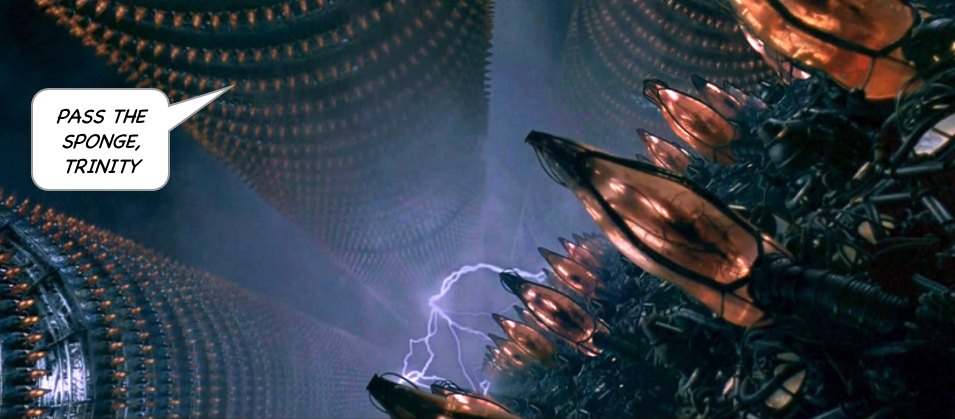Call bullshit: Difference between revisions
Amwelladmin (talk | contribs) No edit summary Tags: Mobile edit Mobile web edit |
Amwelladmin (talk | contribs) No edit summary Tags: Mobile edit Mobile web edit |
||
| Line 3: | Line 3: | ||
{{quote|''[[Aus der Kriegsschule des Lebens]]: Was mich nicht umbringt, macht mich stärker.'' — “From the military school of life: that which does not kill me, makes me stronger.” | {{quote|''[[Aus der Kriegsschule des Lebens]]: Was mich nicht umbringt, macht mich stärker.'' — “From the military school of life: that which does not kill me, makes me stronger.” | ||
:—{{author|Friedrich Nietzsche}}, {{br|Götzen-Dämmerung}}}} | :—{{author|Friedrich Nietzsche}}, {{br|Götzen-Dämmerung}}}} | ||
Great lakes of electronic ink are spilt by [[digital prophet]]s, [[thought leader]]s and | Great bitter lakes of electronic ink are spilt by [[digital prophet]]s, [[thought leader]]s and those of gentle fabric who seem, these days, to be inheriting the earth — I guess the Bible said it would happen, so we shouldn’t be surprised — about the the need for [[safe space|spaces to vouchsafe psychological safety]]: we are, it seems, an uncommonly fragile lot; at the best of times, the toxicity of [[banter]] is an existential threat, and now we are at a low ebb: our constitutions enfeebled by [[Covid-19]], we are now so weak that [[best practice]] is to serve written warning before clearing your throat, for fear of mortally wounding nearby workmates, unused to human proximity. | ||
Look: if you are so fragile you need a [[safe space]], don’t go out, and [[get off Twitter]]. | Look: if you are so fragile you need a [[safe space]], don’t go out, and [[get off Twitter]]. | ||
[[Safe space]]s protect bad ideas. Good ideas don’t need safe spaces. Humans are [[antifragile]] things: we react well to ''little'' shocks: they toughen us up. Insulating ourselves from them makes us yet more prone to them. It wasn’t {{author|Nassim Nicholas Taleb}} who first make this connection by the way, but {{author|Friedrich Nietzsche}}. | [[Safe space]]s protect ''bad'' ideas. Good ideas don’t ''need'' safe spaces. Humans are [[antifragile]] things: we react well to ''little'' shocks: they toughen us up. Insulating ourselves from them makes us yet more prone to them. It wasn’t {{author|Nassim Nicholas Taleb}} who first make this connection by the way, but {{author|Friedrich Nietzsche}}. | ||
{{quote|“It’s this idea of constantly rethinking, “Okay, what [[System|systems]] might be unfair in the world? What groups might be disadvantaged or marginalized or excluded, and what is my responsibility and my opportunity to try to do something about that?” That’s something we should always be open to revising.” | {{quote|“It’s this idea of constantly rethinking, “Okay, what [[System|systems]] might be unfair in the world? What groups might be disadvantaged or marginalized or excluded, and what is my responsibility and my opportunity to try to do something about that?” That’s something we should always be open to revising.” | ||
Revision as of 13:47, 18 December 2022
|
“Life is pain, highness. Anyone who says differently is selling something.”
- —Westley, The Dread Pirate Roberts, The Princess Bride
Aus der Kriegsschule des Lebens: Was mich nicht umbringt, macht mich stärker. — “From the military school of life: that which does not kill me, makes me stronger.”
Great bitter lakes of electronic ink are spilt by digital prophets, thought leaders and those of gentle fabric who seem, these days, to be inheriting the earth — I guess the Bible said it would happen, so we shouldn’t be surprised — about the the need for spaces to vouchsafe psychological safety: we are, it seems, an uncommonly fragile lot; at the best of times, the toxicity of banter is an existential threat, and now we are at a low ebb: our constitutions enfeebled by Covid-19, we are now so weak that best practice is to serve written warning before clearing your throat, for fear of mortally wounding nearby workmates, unused to human proximity.
Look: if you are so fragile you need a safe space, don’t go out, and get off Twitter.
Safe spaces protect bad ideas. Good ideas don’t need safe spaces. Humans are antifragile things: we react well to little shocks: they toughen us up. Insulating ourselves from them makes us yet more prone to them. It wasn’t Nassim Nicholas Taleb who first make this connection by the way, but Friedrich Nietzsche.
“It’s this idea of constantly rethinking, “Okay, what systems might be unfair in the world? What groups might be disadvantaged or marginalized or excluded, and what is my responsibility and my opportunity to try to do something about that?” That’s something we should always be open to revising.”
- —Adam Grant, Wharton’s “top-rated professor for seven straight years”
Show me a system that isn’t unfair, arbitrary, capricious, conferring of authority on dubious men — you know: systems like academic tenure, or popularity contests for best professor at Wharton— and I’ll show you someone with a colossal lack of perspective.
Stop fetishising minor grievance. Stop imaginatively conceptualising inequity and substituting it for worth. The world is comprised of inequity. The world is an emergent property of inequity. The converse of inequity is entropy — the oatmeal, tepid, limitless sludge of heat death, to which the Universe is in any case progressing: for God’s sake don’t accelerate the journey. Rather than forlornly trying to re-render the irretrievably human as impossibly divine — rather than sanctifying the fragile, thereby making it more so, learn to be antifragile. Identify your own advantages and build on them. Build your own systems to dampen your own vulnerability, and those of people you care about.
Be robust. Expect others to be too. Be spiky. Expect to be spiked. Answer back. Expect to be answered back to. Give banter. Take it. Call bullshit. Expect to be called for it. Cast stones bearing in mind you are not without sin.
